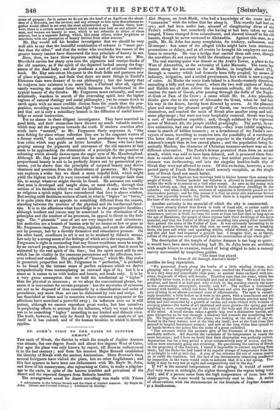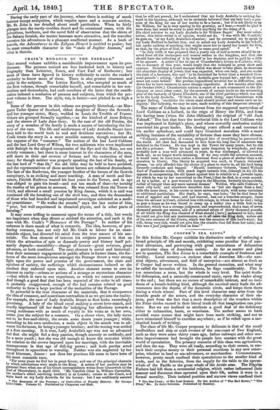ST. JOHN'S VISIT TO THE OASIS OF JUPITER
AMMON.* THE oasis of Siwah, the district in which the temple of Jupiter Ammon was situate, lies one degree South and about five degrees West of Cairo. For ages the place was only known by report, till Browne rediscovered it in the last century ; and from his account Major Remelt established the identity of Siwah with the ancient Ammonium. Since Browne's time, several foreigners have visited the place, but no other Englishman ; and this fact appears to have been one inducement with Mr. Bayle St. John, and three of his countrymen, also sojourning at Cairo, to make a pilgrim- age to the oasis, in spite of the known troubles and privations of the desert and the reported dangers from Bedouin banditti.
The arrangement usual for desert travelling was made with Yfinus
• Adventures In the Libyan Desert and the Oasts of Jupiter Ammon. By Bayle SL John. [Home and Colonial Library.] Published by Murray.
Abti Shayen, an Arab Sheik, who had a knowledge of the route and a "connexion" with the tribes that lay along it. This worthy had lost an eye • and bad been under ban, accused of slaughtering three of the Pasha's soldiers ; but somebody else having at last been taken up and hanged, Units emerged from concealment, and showed himself in his old haunts, though he never ventured to Alexandria. Against this man, as a guide, Mr. St. John has many complaints, for trickery, sullenness, and ill-temper : but some of the alleged tricks might have been necessary precautions or delays, and at all events he brought his employers out and home in security. He was a bridge that carried them safe over, though the travellers do not exactly fulfil the directions of the proverb.
The real starting-point was Abusir or the Arab's Tower, a place to the West of Alexandria, at the extremity of Lake Mareotis. 'The route lay thence along the sea-coast as far as Mudar, in longitude about 27i, through a country which bad formerly been fully peopled, by means of industry, irrigation, and a settled government, but which is now a region of ruins. At Mudar the route leads inland in a South-westerly direction, ascending a billy and stony desert, where the two well stations of Salem and Haldeh are all that relieve the mountain solitude, till the traveller reaches the oasis of Garai', after passing through the defile of the Nugb- el-Grab or Pass of the Crow ; a name which Mr. St. John plausibly thinks gave rise to the story of Alexander the Great, when he bad lost his way in the desert, having been directed by crows. At the pleasant place and among the pleasant people of Garah, our travellers recruited themselves, and reached the oasis of Siwah after another steep and toil- some pilgrimage ; but were not very hospitably received. Siwah was long a sort of independent republic ; and, though subdued by the vigorous power of Mehmet Ali, the people yielded grudgingly. The party, in na- tive estimation, had one of two characters,—they were infidel magicians, come in search of hidden treasure ; or a detachment of the Pasha's sur- veyors of taxes, travelling to examine into the possibility of a surcharge. The latter class of gentry are not more popular in the vicinity of Jupiter Ammon's temple than in less sacred places ; and the population being fa- natically Moslem, the character of Christian treasure-seekers was an in- different alternative. The Pasha's firman protected them from an actual attack, which was said to have been debated, and it procured them free- dom to ramble about and visit the ruins ; but neither provisions nor as- sistance was forthcoming, and into the singular beehive-built city of Siwah they were not allowed to enter. Of this exclusion, however, a sus- pected party of Frank Benedicts could scarcely complain, as the single men of Siwah fared not much better.
"Not among the Spartans was marriage held in higher honour than among the people of Siwah. Neither bachelor nor widower is allowed to dwell permanently within the walls or to remain on a visit after sunset. As soon as the young men reach a certain age, they are driven forth to build themselves dwellings in , the suburbs ; and when a wife dies, sentence of expulsion is forthwith passed on her disconsolate partner; and for this reason it is that on every side numerous houses exist, but especially towards the North, where there is a regular quarter round the base of the second conical hill."
Another curiosity is the material of which the city is constructed.
"I have already hinted that Siwah is built of fossil salt, or rather earth in which salt is mixed in great proportions, sometimes more than half; and this cir- cumstance, curious in itself, becomes the more so from the fact that as long ago as the age of Herodotus the people of these regions built their dwellings of the same material, and that the Father of History for recording this among other incredible facts gained the name of the Father of Lies. It was extremely interesting to us to detach portions from the walls that rose on every side, and see on breaking them, the pure salt white and sparkling within, whilst without, of course, dust and dirt and heat had imparted a greyish hue. I imagine that, as at Garah, rafters of the palm-tree enter plentifully into the construction of the whole pile."
The description of the temple of Jupiter Ammon is too long to quote : it would have been more informing had Mr. St. John been an architect, with ample leisure to examine, instead of being obliged to take a cursory survey surrounded by suspicious guides.
"The fount that played In times of old through Ammon's shade" justifies its long reputation.
"We proceeded Sauth along the banks of a little winding stream, and, plunging into a delightfully cool grove, soon reached the Fountain of the Son. It is a very deep and remarkably clear pool; in ancient times enclosed with ma- sonry, fragments of which still remain. Tradition says that the water, which has a slightly bitter taste, is hot at midnight and cool at mid-day. We tried its tem- perature, and found it at half-past nine o'clock in the morning exactly the same as the surrounding atmosphere, namely, only 84°. The surface is continually covered with bubbles, which rise from the bottom and give the pool the appear- ance of being in an almost continual state of effervescence. The spot is exceed- ingly beautiful; a little hollow as it were in the grove, with a translucent and yet disturbed expanse of water, the remains of the broken fountain strewed upon the brink and half concealed by a growth of rushes and reeds twined with wreaths of creeping plants—the works of art shattered and moss-grown—the spring gay and laughing as ever, reminding one of the ruin of the body and the endunng youth of the mind. A small stream takes a gentle leap over a diminutive barrier, and goes whispering on its way through a shadowy bed towards the mouldering tem- ple. We lingered some time at this 'Ace; now looking at the shred of sky re- flected in the busy waters; now at the blue sky itself; now at the fruit-trees that pressed in tangled luxuriance around; and now at the long vistas that opened on all hands between the palms like the aisles of a great cathedral. "The accounts which the ancients give of the Fountain of the San are re- markably uniform. All describe the variations of its temperature in nearly the same language; and I have no doubt that their observation was perfectly correct. Ammonium was for a long period a place comparatively easy of access, and tra- vellers were constantly going and returning. On questioning the natives of Siwah on the properties of this fountain I found it impossible to extract anything from them ; but the Bedawins had herd of its regular change of temperature from hot at midnight to cold at mid-day. A stay of ten minutes did not of course enable us to verify the tradition; but the fact of our thermometer remaining unaffected by immersion in the water would seem to indicate that it is a hot spring. Pro- bably it may be very hot at night and comparatively cool in the day.' If 84° is the natural temperature of the spring, it would of course feel very warm at midnight, the nights throughout the region being very cold ; and if a person came from the high temperature of noon into the shady grove, the water would be comparatively cool to him. A series of observations with the thermometer on the fountain of Jupiter Ammon IA a desideratum. Daring the early part of the journey, where there is nothing of much interest except antiquities, which require space and a separate section, Mr. St. John is too detailed about small particulars. When he fairly plunges into the rarely-trodden desert and its occasional oases, with the privations, incidents, and the novel field of observation that the skirts of the Sahara furnish, the matter becomes more attractive, and the traveller narrates his adventures in a pleasant unaffected manner. As a book of travels, the Adventures in the Libyan Desert is entitled to praise; but its most remarkable character is the "oasis of Jupiter Ammon," and what is therein.



























 Previous page
Previous page